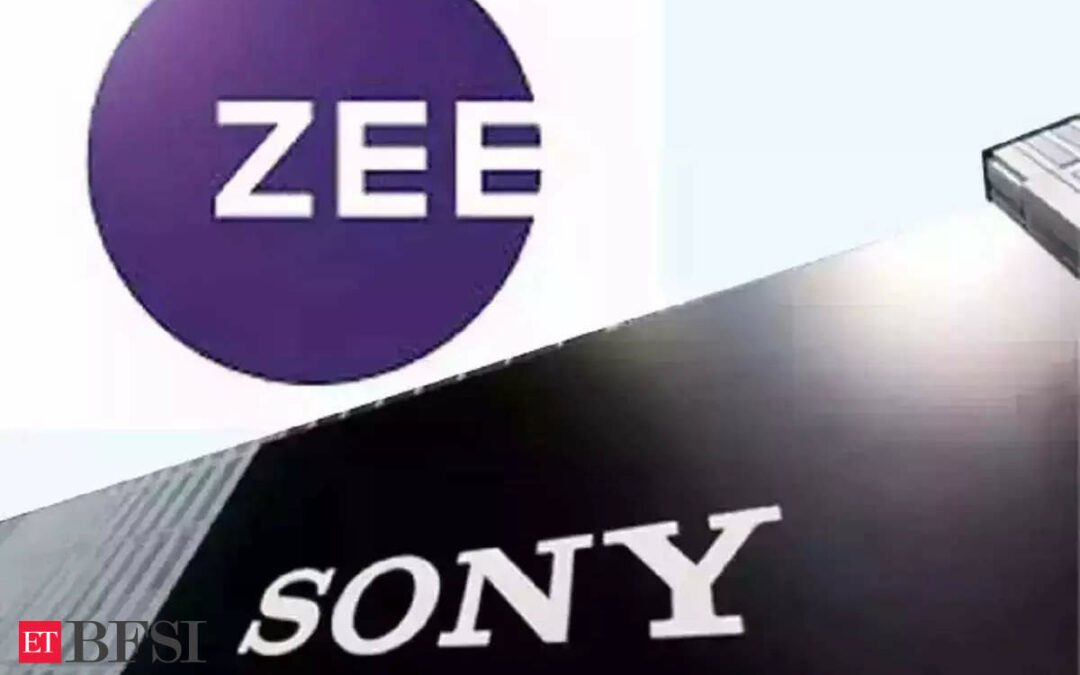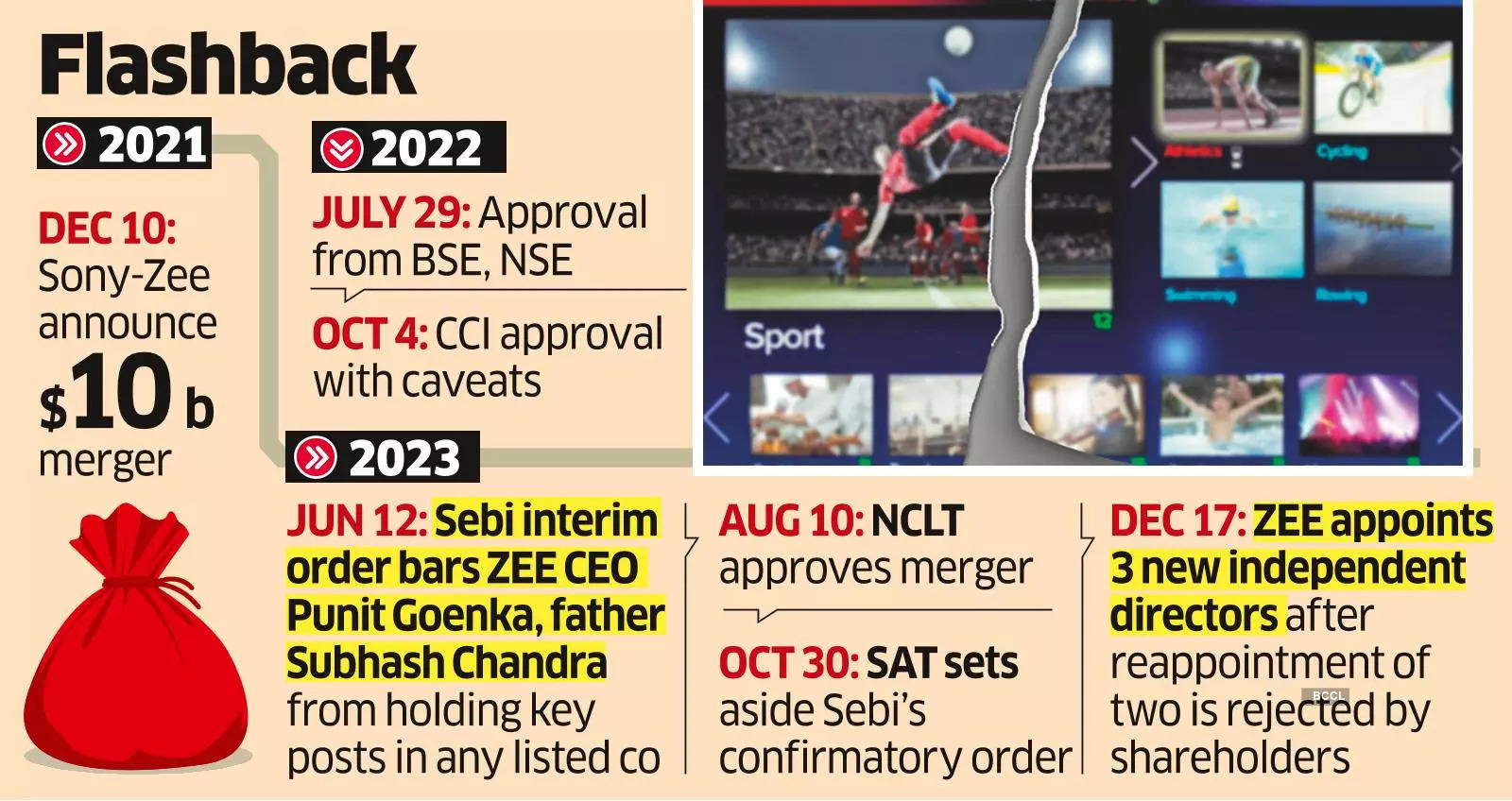Sony Group Corp is close to calling off its proposed $10 billion merger between its India operations with Zee Entertainment Enterprises Ltd (ZEEL) – first announced two years ago in a bid to create India’s largest broadcast company — owing to what it sees as the inability of the latter to fulfil several conditions laid down in the merger agreement, two people aware of the development said.
The lapses in complying with what are called conditions precedents (CP) in legalese, has added to the simmering discontentment between the suitors, who thus far couldn’t agree on ZEEL MD Punit Goenka being the CEO of the merged entity, until he’s cleared of charges that he siphoned off money from the publicly-traded firm to closely held companies owned by his family’s Essel Group. The Goenka family owns 3.99% equity in ZEEL.
Sony is planning to officially send a termination notice to Zee by this month end, maybe as early as January 22nd, said two people aware of the matter, unless Zee relents on key clauses. Sources close to Zee said most operational CPs have been “cured” while some joint ones are pending from both sides and those linked to the actual consummation of the merger will happen on deal closure.
However discussions are still ongoing between two sides and their lawyers — Trilegal for Zee and Shardul Amarchand Mangaldas for Sony — to find a breakthrough which some are still hopeful of. These meetings kickstarted ever since on December 20th Zee informed the stock exchanges that it is entering into a good faith agreement with Sony – a contractual provision under the Merger Cooperation Agreement (MCA) signed between both parties in December 2021 — to discuss the extension of the date required to make the merger scheme effective by a reasonable period.
As per the Clause 8.25 of the MCA, the “good faith” clause gets triggered only if the merger scheme is ineffective within a stipulated period previously agreed upon. “It is clarified that there shall be no limitation on the number of times that parties shall be permitted to mutually extend the extended end date (as applicable). If (A) the parties are unable to mutually agree to an extended End Date within a period of 30 days from the last effective End Date (which for the sake of clarity may include an extended End Date or (B) the Scheme and all transaction Documents have not become effective in accordance with its terms within the extended End Date mutually agreed by the parties under this Clause 8.25, any party may terminate this agreement, by giving written notice to each of the other Parties.” Even though the good faith timelines can get extended, sources at Sony Global suggest repeated extensions may not be viable given the poor state of financials of Zee which gives them the right to walk away from the previous terms of engagement. This triggers a “material adverse effects” clause. The merger agreement had a band below which the company financials could not go. Since the merger was announced, Zee’s EBITDA (operating profit) has come down to Rs 1107 crore in March 2023 from Rs 1606 in March 2021 but net profit has plummeted to Rs 48 crore from Rs 793 crore in the same period. In March 2022, profits were at Rs 956 crore. “This bridge is impossible to fix,” according to an official. Sources close to Zee said the entire industry including Zee has been hit and ZEEL poor financial performance does not trigger any material adverse impact.
Zee declined to comment. Sony Global’s spokesperson did not respond to ET’s detailed questionnaire.
Anger over appointment
At Sony’s headquarters in Los Angeles senior leaders like Eric Moreno, Executive Vice President, Corporate Development & M&A, Sony Pictures Entertainment and Ravi Ahuja, Chairman, Global TV Studios and Sony Pictures Entertainment Corporate Development, have been flummoxed and frustrated that even after two years, the deal is not closing despite receiving all key approvals, including that of the Competition Commission of India, the National Company Law Tribunal, stock exchanges and shareholders.
From Zee’s end, the appointment of Punit Goenka as the MD and CEO of the has become a key issue to stall the merger, thus far. Goenka wants Sony to honour the original terms of the merger scheme wherein he was to serve as MD and CEO of Sony-Zee for a period of five years from the effective date, subject to terms and conditions.
However with Sebi slapping bans on Goenka and his father Subhas Chandra from holding key posts in listed companies in August 2023, Sony has not been keen on him heading the merged entity. Instead it recommended its India MD and CEO NP Singh as CEO of the new entity, in the interim unless Goenka exonerates from all pending cases, ET has reported. Goenka though has been emboldened after he was reinstated as the managing director and chief executive of Zee Entertainment on October 30th after the Securities Appellate Tribunal (SAT) overturned a ban imposed by the market regulator for allegedly siphoning off company funds.
Sony, said people in the know on conditions of anonymity as the discussions are still in private domain wants Goenka to voluntarily step down, but stay on in an advisory or as a director with an advisory fee for a certain period. One of the sources mentioned above even said, some months back, Goenka even agreed verbally to step down but did not put it in writing. Sources close to Zee said these are speculations and add that Goenka has only been insisting on the implementation of the original composite scheme in toto, else fresh shareholder approvals be taken.
The Goenka family owns only 3.99% of the company yet remain the promoters. Institutional and pubic shareholding in the company is 96.01% as of September 2023. If the merger came through Sony would have owned 50.86% stake in the merged company. Even though the Goenka family’s stake would have remained the same, there was a claw back clause that would have helped them ratchet up their shareholding over time.
“There is now a massive trust deficit and over time the divergence has only widened,” said a person who did not wish to be identified.
CPs outstanding
Common in wills, trusts or any M&A documents, CPs are a legal term that defines certain conditions that must either occur or be met by either party to ensure progress or execution of a contract. Sources close to Sony said most of the important CPs to be fulfilled by Zee are still outstanding. Even the “standstill agreements” have been breached. Once a merger is announced both parties involved agree on a standstill agreement meaning, they will keep each other in the know regarding strategic decisions.
A number of actions by Zee subsequent to the signing of the merger agreement have now emerged as irritants in the eyes of its suitor.
As per the original terms of the merger, beyond a certain value, Zee management had to seek Sony’s permission to buy any content or assets and vice versa. But in August 2022, Goenka agreed to sub-licensed the linear television rights from Disney Star of the International Cricket Council (ICC) men’s events for the next cycle. Zee Entertainment’s agreement, for approximately $1.5 billion, in a first-of-its-kind alliance between rival broadcasters sharing the media rights of the matches. Sony HQ was initially not kept in the loop. To be fair, the CCI approval had not come in by then, so according to lawyers, Zee could not have informed Sony else it would seem that both were acting in concert. However, Sony construes this as a violation of the standstill agreement, if not an explicit CP breach. Sony eventually relented with one condition — any losses accrued will have to be absorbed by Zee upfront and not added to the liability of the new merged entity such that it does not impact their shareholder value. ET on December 28 reported that Zee and Disney’s deal is yet to get consummated as Zee has not given the required bank guarantees to Disney Star. The matter is likely to go legal. Sources close to Zee said, in the FY23 annual report the company, Zee has said that the acquisition of ICC TV rights is subject to certain CPs that are still pending.
There are certain non-core real estate assets in which certain ZEEL operations are housed that needed to be divested due to regulatory overhang. The matter is still outstanding.
Zee has subsidiaries in Russia – Zee CIS Holdings (wholly owned) and Zee CIS LLC (49% held directly; 51% indirectly). Sony, being an American entity, could not do business with entities with links to Moscow and had requested Zee to divest or close or spin off these arms. It hasn’t happened till date. Sources close to Zee said, operations in Russia, Germany and even Thailand, though profitable, have been closed. Zee opened a channel in Africa, in violation of standstill agreement.
Zee invested Rs 522 crore in a content company called Margo in April 2020 a year before the Sony merger announcement. Margo entered into a contract with Indian Railways for content streaming, but the contract was cancelled, and Margo moved court. Sony wanted the investment to be hived off and not be included in the merged co as part of the CP. In its 2022 annual report, ZEE Entertainment said, “The Management as part of its portfolio rationalisation initiative and conditions of impending merger; is in the process of either liquidating/ discontinuing/ selling certain entities (primarily Margo Networks Private Limited). Basis the same, the Management has classified the investment in relation to these entities as Non-current Assets held for sale/disposal under IND AS 105 (‘Non-current Assets Held for Sale and Discontinued Operations’). Considering these assets are held for sale, the assets have been recorded at their realisable value. Accordingly, the company recorded an impairment of Rs 3,313 million (Rs 331 crore) on such assets which has been disclosed as an exceptional item. However, sources close to Sony say the matter is still not closed.
Boardroom backlash
Just days before the merger was to close in December, two independent directors of ZEEL Vivek Mehra and Sasha Mirchandani’s reappointment proposals were defeated after they failed to get approval from 75% of shareholders. Another Adesh Kumar Gupta, retired by rotation, so the resolution proposing his reappointment became infructuous during the 41st AGM. Deepu Bansal, a Chartered Accountant and Senior Partner in NDB & Associates LLP, Chartered Accountants was appointed as an independent director.
Three new independent directors, Venkata Ramana Murthy Pinisetti, Shishir Babubhai Desai and Uttam Prakash Agarwal were appointed as independent directors with effect from 17 December 2023. However, barring Bansal, the other three need to be voted in by the shareholders. The matter is still outstanding.
“Sony is singed and Zee is hanging by the skin of the teeth,” said an official in the know.












